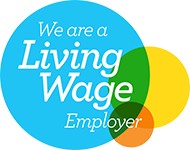UWTSD is part of successful £100,000 bid to deliver local food procurement project
09.11.2019
The University of Wales Trinity Saint David (UWTSD) welcomes the Welsh Government’s recent announcement that Carmarthenshire’s Public Services Board (PSB) has been successful in its bid for £100,000 to improve the procurement of local food from the region.

Lee Waters, AM, Deputy Minister, Barry Liles, OBE, and First Minister Mark Drakeford, AM
The University and Coleg Sir Gâr are part of the Carmarthenshire PSB’s bid to the Foundational Economy Challenge Fund to deliver a food procurement methodology across the partnership of 14 public sector organisations in the county. First Minister Mark Drakeford and Deputy Minister for Economy Lee Waters made the announcement during a visit to the University’s Carmarthen campus on this week.
Barry Liles, OBE, Pro-Vice Chancellor (Skills & Lifelong Learning) at UWTSD and Chair of Carmarthenshire Public Services Board (PSB) said:
“As a PSB we are really pleased to have been successful in our bid to the Foundational Economy Challenge Fund.
Public sector procurement is an area that we as partners recognise as having scope to have a greater impact on local economic wealth and development and this something we will test and develop in our project. We will focus on public sector food procurement but we firmly believe that if we can develop a multi-agency progressive procurement methodology as part of this project, there would be scope to introduce this in other areas of procurement.
Carmarthenshire has a rich history of food production and supply and as well as the economic benefits of enhancing the local supply chain we will also be looking at the potential health benefits for the pupils, students and staff that consume the food we procure, by promoting good food for all.
We look forward to working with our PSB members and partners in the commercial sector to consider and develop opportunities for moving this much talked about agenda forward, learning from the other successful projects as we go”.
During their visit, the First Minister and Deputy Minister met catering staff at the University including head chef Kevin Hodson who was part of the team who won the Soil Association’s Gold Award in 2014 for its support of local producers.
项目,被博士领导了公安局Jane Davidson, Emeritus Pro-Vice Chancellor at the University and former Welsh Government Environment Minister and Professor Kevin J. Morgan, Professor of Governance and Development at Cardiff University, is one of 52 experimental initiatives across Wales to receive a share of the £4.5m Foundational Economy Challenge Fund. The project will provide business opportunities for locally or regionally-based companies and bring environmental benefits by lowering food miles and associated carbon costs.
The foundational economy approach is being adopted by cities and regions across the world, but Wales is the first country in the world to embrace it on a national scale. It is made up of the everyday goods and services we all need and use with estimates suggesting it accounts for four out of every 10 jobs and £1 in every three we spend.
The Foundational Economy Challenge Fund aims to support a series of experimental projects which will enable the Welsh Government, with support from partners, to test how the foundational economy can best be supported.
Eight schemes in Mid and South West Wales will share almost £650,000 from the fund.
Note to Editor
TheWell-being of Future Generations (Wales) Act 2015establishes a statutory board, known as a Public Services Board (PSB), in each local authority area in Wales. The PSB is a collection of public bodies working together to improve the well-being of our county.
This means that as a group we must improve the economic, social, environmental and cultural well-being of our area by working to achieve the 7 Well-being goals. We will assess the state of economic, social, environmental and cultural well-being and publish a well-being plan setting out our local objectives and the steps we will take to meet them. We must follow the sustainable development principle - meeting the needs of the present without compromising the ability of future generations to meet their own needs.
Our four statutory members are:
- Carmarthenshire County Council
- Hywel Dda University Health Board
- Mid and West Wales Fire and Rescue Service
- Natural Resources Wales
Our other partners are:
- Coleg Sir Gâr
- University of Wales Trinity Saint David
- Dyfed Powys Police
- Dyfed-Powys Police and Crime Commissioner
- Department for Work & Pensions
- Carmarthenshire Association of Voluntary Services
- Welsh Government
- National Probation Service
- Wales Community Rehabilitation Company
- Brecon Beacons National Park Authority






